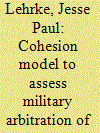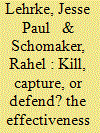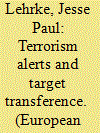|
|
|
Sort Order |
|
|
|
Items / Page
|
|
|
|
|
|
|
| Srl | Item |
| 1 |
ID:
127814


|
|
|
|
|
| Publication |
2014.
|
| Summary/Abstract |
The purpose of this article is to outline a model of cohesion useful for assessing military arbitration of revolutions. Current approaches to the study of revolution are not able to adequately integrate the military into their analysis. To remedy the lack of appropriate tools, this article outlines a model of cohesion that may be useful for conceptualizing and examining the behavior of military forces during domestic political crises. Building on the so-called standard model of cohesion, the article develops a cohesion-coordinated action model that incorporates a structural social cohesion element and a voluntarist-coordinated action element, both of which also capture the relations and interactions between the military, the regime, and the opposition. It thereby fulfils the requirements that a model must possess but where other approaches fall short. The article concludes by outlining how this model can be used in further research in order to advance the study of the military's role in revolutions.
|
|
|
|
|
|
|
|
|
|
|
|
|
|
|
|
| 2 |
ID:
152822


|
|
|
|
|
| Summary/Abstract |
This article examines the effectiveness of contemporary counterterrorism strategy in the global fight against terrorism from 2001 to 2011. We seek to maximize the comparative approach more than most existing studies by examining three tactics (killing, capturing, and defending) applied at three scopes (leader, operational, and broad) on three levels (global, movement [jihadi], and organizational [al-Qaeda and Taliban]), while also measuring effectiveness along several quantitative, qualitative, and spatial dimensions. Drawing from resource theory (and its derived analytical approaches) and empirical terrorism studies, we formulate competing hypotheses that are quantitatively tested using a dataset with several original aspects. We find that both killing and capturing can have large effects but these effects vary based on both states' and terrorists' targeting strategies. The most interesting specific findings are that drone strikes seem counterproductive for counterterrorism while renditions seem effective. However, these effects were dwarfed by those of increased defenses, which reduce attacks in the West while redirecting them to other areas in the world. While we find the theory mostly sound, though in need of refocus, we believe current policy trends foretell an increase in terrorist activity in the coming years.
|
|
|
|
|
|
|
|
|
|
|
|
|
|
|
|
| 3 |
ID:
133509


|
|
|
|
|
| Publication |
2014.
|
| Summary/Abstract |
This article seeks to determine the mechanism(s) behind the convergence of domestic counterterrorism regulations that has been noted across many Organisation for Economic Co-operation and Development (OECD) countries. Four hypotheses are developed and tested through regression analyses. These hypotheses examine (1) U.S. influence, operationalized though a unique U.S. footprint indicator; (2) national characteristics; (3) the extent to which states' domestic structures match; and (4) international networks. We find little support that U.S. influence matters. The international influence that does exist seems to operate through networks promoting learning, especially following a rise in the general global threat level. National characteristics as a driver also find some support.
|
|
|
|
|
|
|
|
|
|
|
|
|
|
|
|
| 4 |
ID:
143591


|
|
|
|
|
| Summary/Abstract |
This article examines how terrorist alerts and terrorist threats interacted during a period of heightened alert in Europe in late 2010. Taking from game theory the concepts of target transference (by terrorists) and defence races (among states) and using their underlying rationalist logic as a causal mechanism, the article attempts to construct an analytical narrative of the till now unwritten history of this event. In the process, the event serves to test whether the observable implications of theory corresponded to reality in this case. The study finds that during the Euro-alert transference in time was more common than transference of place and that there was more resistance to defence races than theory predicts. The alert itself was only a qualified success; the extent to which it was effective was determined by its combination with other offensive actions. The findings call for more attention to be given to terrorist preferences, inter-temporal transference and its relationship to bandwagoning, and state resistance to defence races with consideration of the role of information.
|
|
|
|
|
|
|
|
|
|
|
|
|
|
|
|
|
|
|
|
|